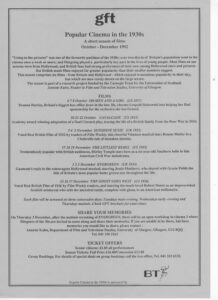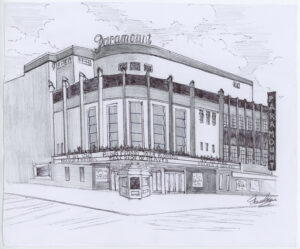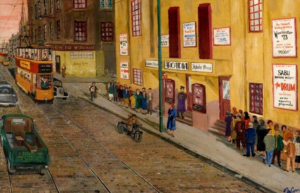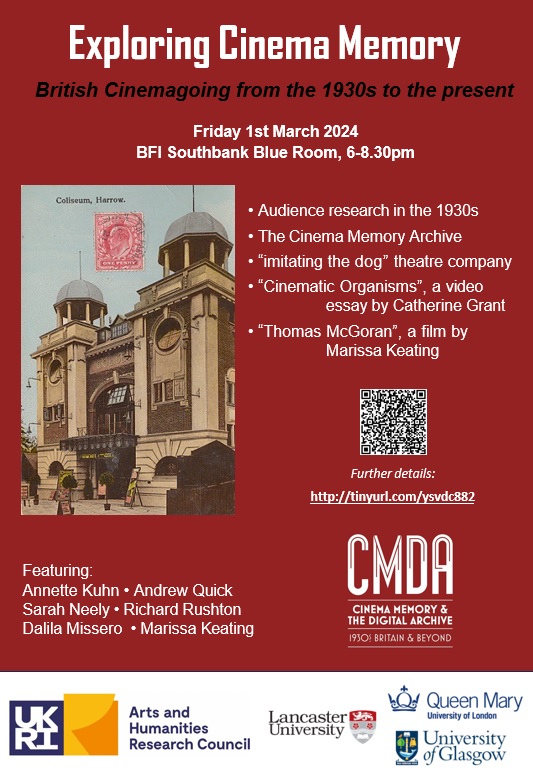Sarah Neely and Annette Kuhn
While work on Cinema Memory and the Digital Archive continues, the conclusion of the project’s Arts and Humanities Research Council-funded period was marked by a programme of events held in Glasgow, the city where the project began life thirty years ago as Cinema Culture in 1930s Britain (CCINTB). In the early 1990s Glasgow Film Theatre (GFT) hosted a season of popular 1930s films, and a number of Glasgow’s surviving 1930s cinemagoers subsequently gave interviews about their youthful cinemagoing.

Popular Cinema in the 1930s, GFT Autumn 1992 [CC-19-000GF001]
Celebrations were launched at the GFT on Friday 7 October 2022 with ‘An Afternoon at the Cosmo in the 1930s’, featuring a special matinee screening of
Un Carnet de Bal (1937, dir. Julien Duvivier). Based on the play ‘Le Pécheur d’ombres’ by Jean Sarment,
Un Carnet de Bal is the story of a recently widowed socialite who finds her first dance card, from twenty years earlier. Seeking to satisfy her romantic curiosity, she sets out to track down her dance partners and find out what has become of them. Described by its director as “a love story whose main character is the past”,
Un Carnet de Bal proved a popular attraction for Glasgow’s filmgoers when the GFT (then known as the Cosmo) first opened its doors in May 1939.
Duvivier’s film was mentioned, unprompted, by two of CCINTB’s Glasgow interviewees, both of whom recall seeing it at the Cosmo–one of them on her wedding day:
“French films were the great things when the Cosmo opened, and they were burgeoning in London at that time. There was a cinema, the Academy Cinema, which George Singleton who opened the Cosmo, he really learnt from. I think he got the same person to buy his films that bought films for the Academy. And things you read about, you know, suddenly they were available in Glasgow for the, for the first time. The opening film was a Julien Duvivier film, Un Carnet de Bal, it was an absolute, oh, a new world opened, you know, seeing that sort of thing.” Tony Paterson, 29 November 1994 [TP-92-013AT001]
“Actually, I was at the opening of what was the Cosmo, it’s the Glasgow Film Theatre now. The, the owner of the Cosmo, one of his sons, was our best man, Jimmy Singleton. Erm, and when I got married and Jimmy was my husband’s best man, we got married very quickly, because the war started. … So the war was declared on the 3rd of September, and we got married on the 23rd. And we had a, just a very quiet wedding, with families, and from there we went to the Cosmo and we saw Un Carnet de Bal, eh, for the adults to go to that after the service, after we had a meal. We got married about lunchtime, had lunch and then they took the, all the company to the cinema, to the Cosmo and saw Un Carnet de Bal. Including the minister! It was one of these cinemas, I don’t know if you know it, one of these films, where they were all going in and out each other’s bedrooms. My mum saying to the minister, “I don’t think you knew that this sort of thing went on, did you?” So after that the older folk all just went away and the younger ones went to the Plaza ballroom.” Helen Smeaton, Glasgow, 23 January 1995 [HS-92-036AT001]
The GFT screening of Un Carnet de Bal was accompanied by a short film by CMDA artist-in-residence, Glasgow-based filmmaker Marissa Keating, about Thomas McGoran, one of the project’s original participants. Now in his nineties, Mr McGoran worked as a projectionist in Glasgow during the 1940s and was interviewed for CCINTB in November 1994 [TM-92-009AT001] and February 1995 [TM-92-009AT002]. After the screening a discussion took place between Mr McGoran and ourselves, with contributions from the audience.
‘An Afternoon at the Cosmo’ was followed by a reception at Glasgow School of Art’s Reid Gallery. ‘Glasgow, Cinema City’, an exhibition running at the Gallery between 1st and 11th October, was developed in collaboration with CMDA and showcased several of the project’s creative outputs: a suite of drawings of Glasgow cinemas by Mr McGoran commissioned for a new audio walking tour created by sound artist Suzy Angus; a selection of his architectural drawings of other Glasgow landmarks; Seeing in the Dark, a digital installation from theatre company imitating the dog; and Marissa Keating’s film, which includes scenes capturing Mr McGoran working on his Glasgow cinema drawings.

Thomas McGoran’s drawing of the Paramount Cinema, Glasgow [TM-92-009-OA031]
When the exhibition ended Mr McGoran’s cinema drawings were moved to the Advanced Research Centre at the University of Glasgow where they remained on show until mid-December. The exhibitions attracted many visitors and a good deal of press coverage, including pieces in the Glasgow
Evening Times and
The Scotsman.
Thomas McGoran’s artworks continue to draw admirers. Following a recent exhibition of his paintings at the Forge Shopping Centre in Glasgow’s East End, he was featured earlier this month on BBC News at Six; and ‘Going to the Pictures’, one of his cinema paintings, was selected to appear on rare bottles of Auchentoshan whisky. “Glasgow was a movie-mad city”, Mr McGoran commented. “There were cinemas everywhere, queued out, every day and every night of the week.” Echoing sentiments expressed by many other CCINTB participants, he added, “Going to the cinema was an escapist thing for us, you know? You used to go there, and you would be carted away to another world.”

‘Saturday Night at the Movies’ by Thomas McGoran [TM-92-009-OA001]
The interviews referred to can be accessed as both audio and transcript via the CMDA website. Along with the other archival assets mentioned, these can also be consulted in physical form in the Cinema Memory Archive at Lancaster University, by appointment with Special Collections.
If you wish to cite and/or re-use any of these materials, please consult the CMDA website for information on copyright and using the materials from the collection and for a citation referencing guide
 Join Annette Kuhn, Richard Rushton, Andrew Quick and Dalila Missero for an evening of reflections, presentations and discussions of the cinemagoing experience, with a focus on memories of ‘going to the pictures’ in Britain during the 1930s.
Join Annette Kuhn, Richard Rushton, Andrew Quick and Dalila Missero for an evening of reflections, presentations and discussions of the cinemagoing experience, with a focus on memories of ‘going to the pictures’ in Britain during the 1930s.

